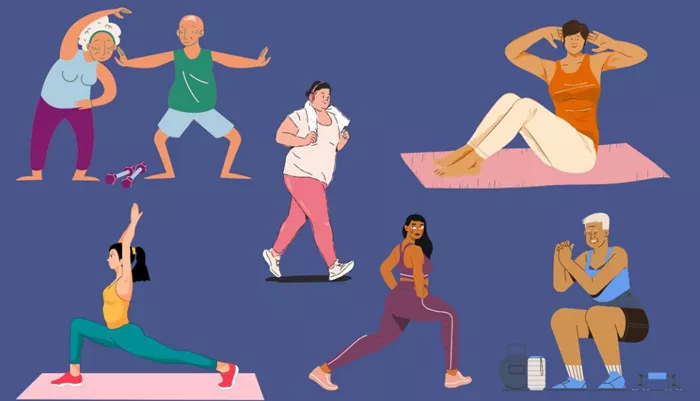A recent review published in npj Biological Timing and Sleep explores how exercise can boost sleep quality, benefiting both individuals with sleep disorders and healthy individuals alike. The review highlights the role of exercise in improving sleep, with factors like age, gender, fitness level, and the timing and intensity of exercise influencing its effectiveness.
Types of Exercise and Timing Matter
Exercise Timing Plays a Key Role
Moderate exercise in the early evening can enhance sleep, but intense workouts too close to bedtime may disrupt sleep by raising body temperature and alertness, delaying melatonin release. On the other hand, light-to-moderate evening exercise may not impact sleep negatively in healthy individuals.
Exercise can be categorized into different types:
Aerobic exercise, such as swimming, cycling, and walking, improves cardiovascular health by increasing heart rate and oxygen intake.
Anaerobic exercise, like sprinting and weight training, focuses on building muscle strength.
Stretching exercises aim to improve flexibility, but their role in injury prevention remains uncertain.
Dynamic exercise, involving joint movement, offers long-term health benefits, including improved blood flow and reduced blood pressure.
Static exercise, where muscles are activated without movement, increases strength over time but can temporarily raise blood pressure.
Among these, aerobic exercise has been shown to offer the most benefits for improving sleep.
Why Exercise is Essential for Health
Exercise not only supports weight management but also plays a crucial role in preventing chronic conditions like diabetes, hypertension, and depression. It enhances cardiovascular health and helps reduce resting heart rate. Furthermore, exercise improves mood, boosts energy levels, and alleviates stress. Enjoyable activities, in particular, are effective in lowering cortisol (the stress hormone) and raising melatonin (the sleep-regulating hormone).
Regular exercise is vital, as a lack of physical activity has been linked to serious health conditions like heart disease, cancer, and diabetes, which contribute to global mortality rates.
How Exercise Improves Sleep
Physical Fitness Enhances Sleep Quality
Regular physical activity strengthens the heart and lowers the resting heart rate, reducing cardiovascular stress and promoting deeper sleep, especially in older adults. In healthy individuals, exercise improves sleep efficiency, which is the ratio of time spent asleep compared to time spent in bed.
Exercise performed four to eight hours before bedtime can help individuals fall asleep faster and reduce wakefulness during the night. However, exercising too close to bedtime (within four hours) can have the opposite effect, delaying sleep by disrupting melatonin release and raising body temperature.
Consistent exercise also promotes better sleep hygiene, helping to stabilize sleep-wake cycles and regulate the body’s circadian rhythms. This process is particularly beneficial for individuals suffering from disrupted sleep patterns caused by jet lag or shift work.
Exercise as a Stress Reliever
Exercise reduces stress and anxiety, both of which can negatively impact sleep. Regular exercise calms the body by lowering the heart rate and improving hormone regulation. This creates a more conducive environment for falling asleep and staying asleep.
Addressing Sleep Disorders Through Exercise
Exercise Helps Manage Sleep Disorders
Exercise has shown promise in treating various sleep disorders. For individuals with insomnia, moderate-intensity aerobic
exercise can improve sleep onset and reduce wakefulness during the night. When combined with sleep hygiene practices, such as maintaining a consistent bedtime and avoiding stimulants before sleep, exercise can be even more effective.
For those suffering from restless leg syndrome (RLS), aerobic exercise can ease symptoms like throbbing and itching in the legs. The review suggests this may be due to better blood circulation and neuromuscular function.
Exercise and Sleep Apnea
People with sleep apnea, a condition that causes intermittent breathing during sleep, can benefit from combining weight loss and exercise. Even without significant weight loss, exercise can reduce the severity of sleep apnea symptoms by improving autonomic nervous system function and decreasing inflammation.
Could Exercise Replace Sleep Medication?
The review suggests that exercise interventions could improve sleep quality similarly to some medications, with fewer side effects and long-term benefits. This is particularly true for conditions like insomnia, restless leg syndrome, and sleep-disordered breathing.
While the findings are promising, researchers call for more studies to understand the exact effects of different types and intensities of exercise on sleep patterns. Long-term studies are needed to assess how exercise impacts circadian rhythms across various populations, and further research should focus on the molecular mechanisms behind exercise’s effects on sleep.
Physical activity should be promoted as a natural, non-pharmacological method for improving sleep. However, clear guidelines about the appropriate intensity, frequency, and timing of exercise for different age groups are essential. Personalizing exercise prescriptions to fit an individual’s fitness level and sleep needs can maximize the sleep benefits of exercise.
Read more:
- The 5 Best Men’s Diet To Lose Belly Fat
- The Best Kegel Exercises To Last Longer
- 5 Simple Exercises To Boost Your Mental Health


